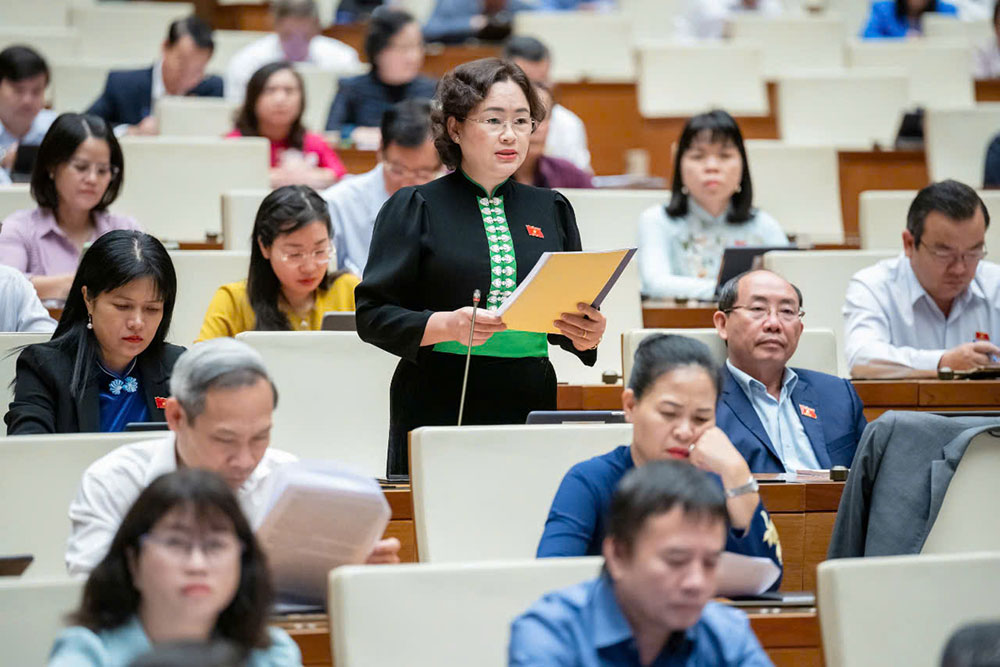
Lò Thị Luyến, deputy head of the Điện Biên delegation of the National Assembly deputies, speaks at the session.
During the session, Deputy Lò Thị Luyến, Deputy Head of the Điện Biên Delegation of NA Deputies, expressed her support for the Government’s report on achievements in 2024 and plans for 2025, as well as the review report from the NA’s Economic Committee.
She proposed several recommendations to tackle difficulties in the field of education and training.
The implementation of the 2018 national general education curriculum has been underway for nearly four years. However, Luyến pointed out ongoing limitations in the printing and distribution of textbooks.
She highlighted signs of vested interests and waste in the printing and distribution of workbooks, noting that 65 per cent of textbooks contain pages on which students write directly, making them unusable for others. The printing and distribution of local education materials also needs reconsideration.
"Currently, many localities have yet to print and distribute local education materials, leaving students to access PDFs on devices or print them independently,” she noted.
According to Luyến, this issue stems from obstacles in determining copyright, assessing prices, and conducting tenders for printing and distribution. Although the NA Standing Committee’s oversight delegation highlighted this in 2019, it remains unresolved.
The deputy proposed a simplified process for localities to implement. She noted that if existing laws, decrees, and circulars continue to be strictly applied, these challenges will likely persist for years.
.jpg)
A view of the session.
Regarding the policy to direct students into different educational paths after lower secondary school, Luyến said this policy, introduced by the Party and Government, aims to develop a workforce with the right skills to meet the economy’s needs.
However, she noted that student tracking efforts have fallen short due to insufficient emphasis on outreach, research, and labor market analysis.
She observed that many students and parents are unclear about career choices and that student tracking is often regarded solely as an educational responsibility, lacking broader political support. In some areas, educational institutions have rigidly implemented tracking, such as by not allowing students to register for high school entrance exams, which has led to low support from parents and students.
Another issue she raised is that local vocational and continuing education centers often lack appeal due to inadequate facilities and insufficiently qualified teachers, especially in remote and disadvantaged areas.
Additionally, vocational training programmes do not align well with job market demands, limiting opportunities for graduates with basic and intermediate-level skills to secure quality jobs.
“I believe that if vocational training were more effective and linked to employment opportunities, the policy on student tracking would gain social approval,” Luyến said.
“Currently, many students choose vocational training only after failing the high school entrance exam. In mountainous and disadvantaged regions, some opt to stay home, marry young, engage in early childbearing, participate in drug trafficking, or fall victim to deceptive recruitment schemes for ‘easy jobs with high pay,’ leading to significant social consequences,” she said.
Luyến suggested that the Government should review and assess the initiative of career guidance and student tracking in general education in the period of 2018-2025, established by Prime Minister’s Decision No 522/QĐ-TTg on May 14, 2018, to propose solutions for more effective student tracking.
She also recommended that the Government continue prioritising the construction of resilient schools in disadvantaged areas to improve infrastructure and invest in boarding facilities for students.




.jpg)
.jpg)

.jpg)
.jpg)

.jpg)



.jpg)
.jpg)
.jpg)
.jpg)
.jpg)

.jpg)
You have 500/500 characters left
Please enter 5 or more characters!!!